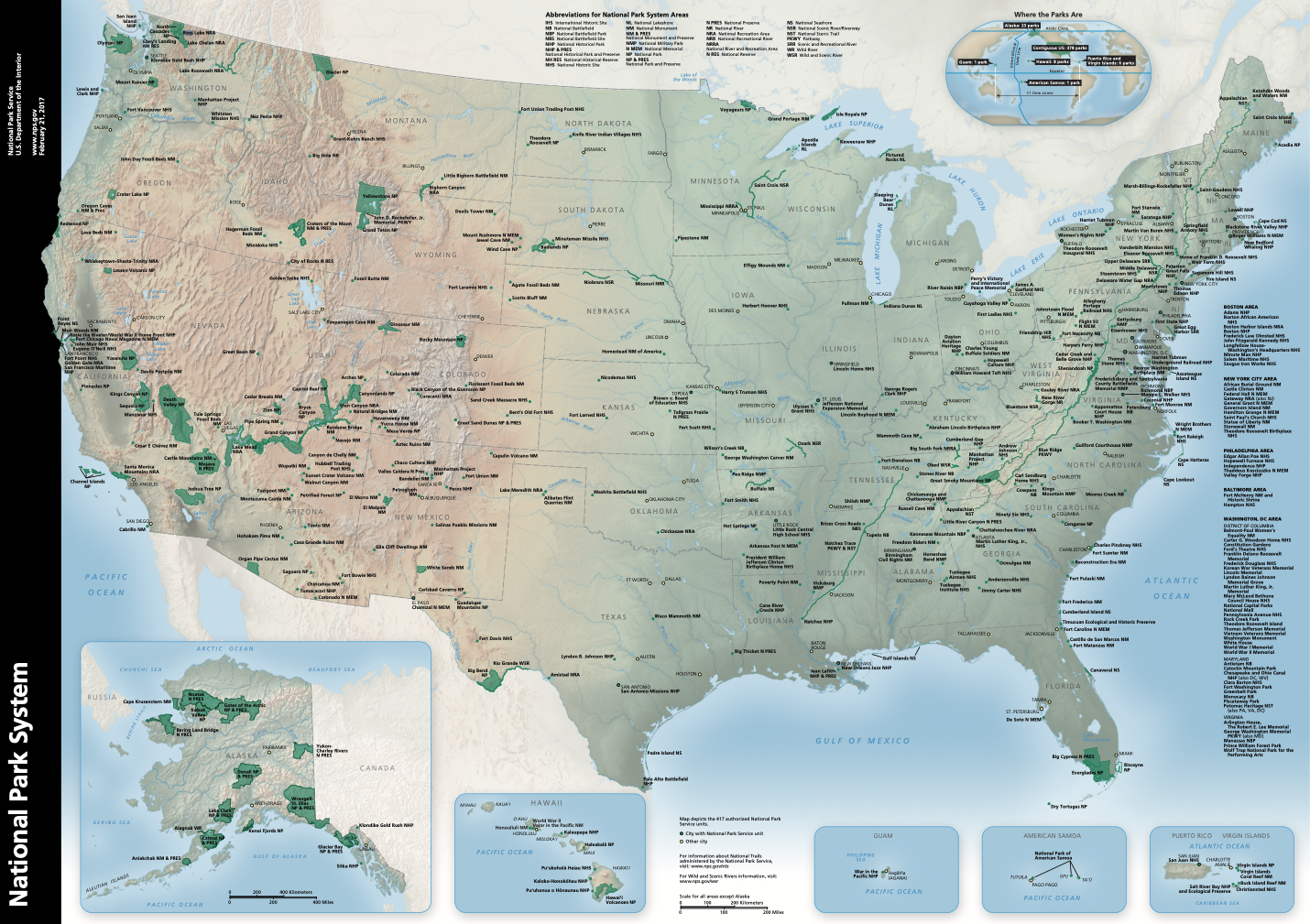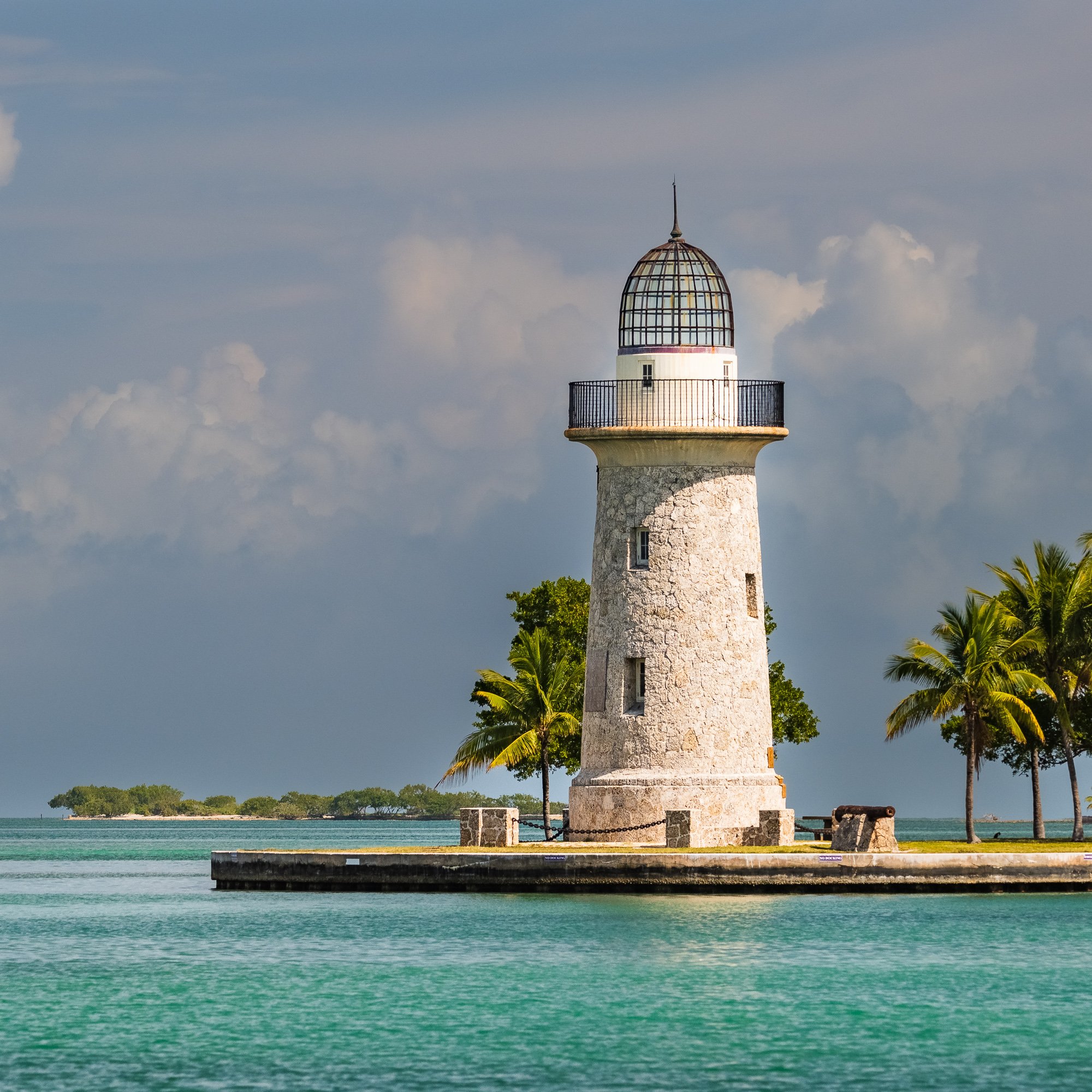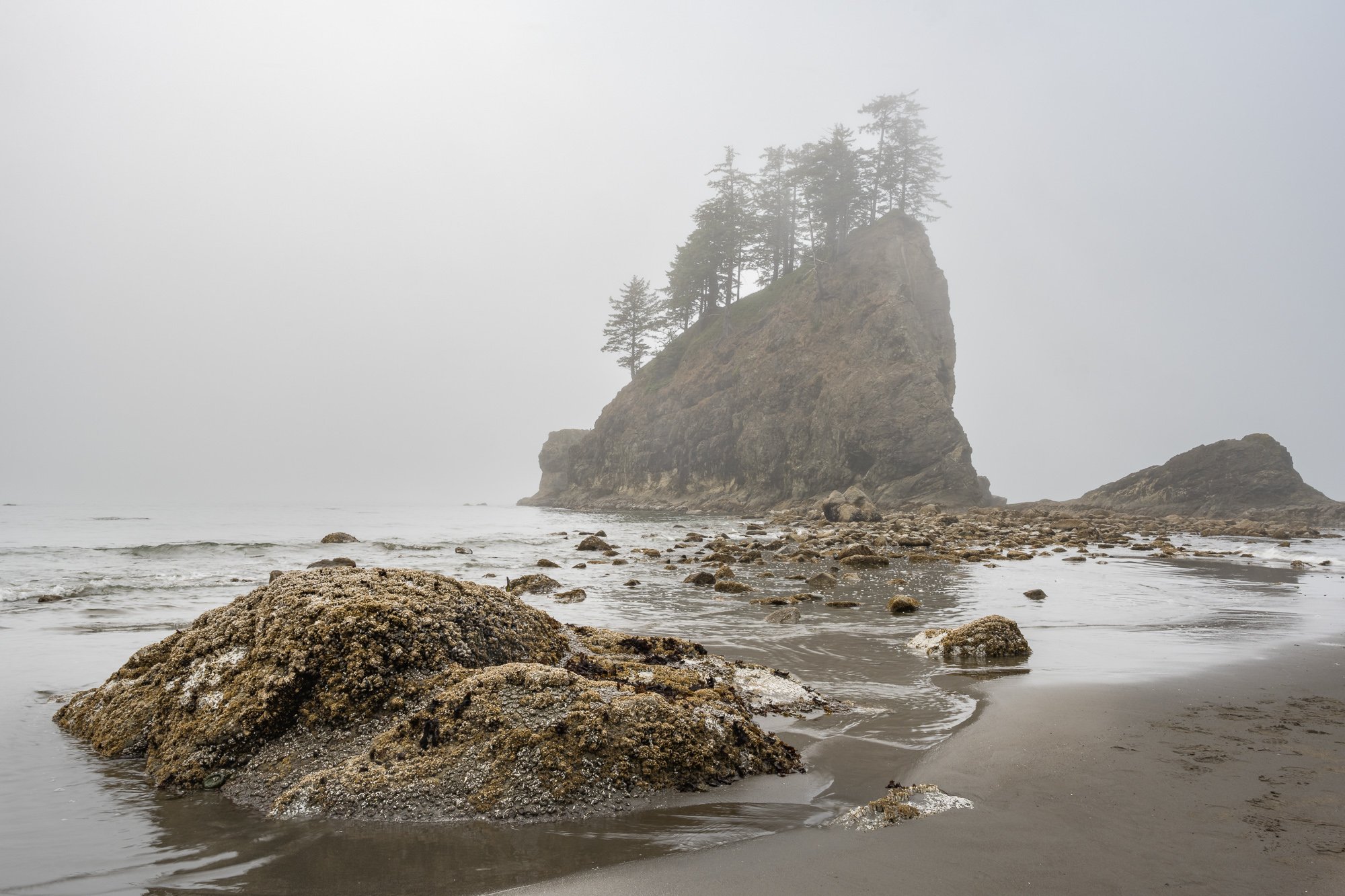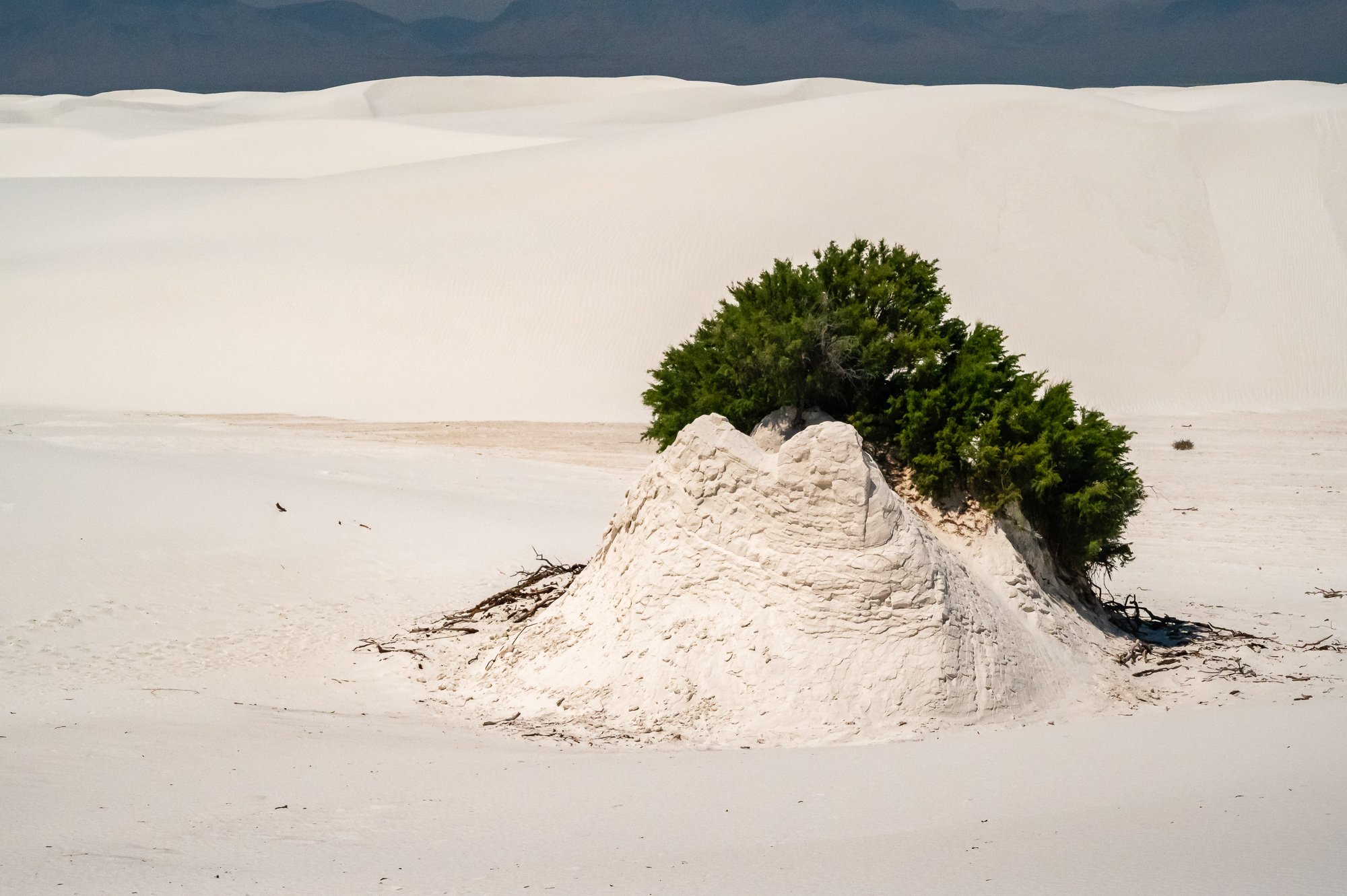United States National Parks
On August 25, 1916, President Woodrow Wilson signed the "Organic Act" creating the National Park Service, a federal bureau in the Department of the Interior responsible for maintaining national parks and monuments that were then managed by the department. The National Park System has since expanded to 429 units (often referred to as parks), more than 150 related areas, and numerous programs that assist in conserving the nation's natural and cultural heritage for the benefit of current and future generations.
On this page, we focus on 63 U.S. National Parks that spread in 31 states and two U.S. territories.
National parks are designated for their natural beauty, unique geological features, diverse ecosystems, and recreational opportunities, typically because of some outstanding scenic feature or nature phenomena” .**
*Source: United States National Park Services, https://www.nps.gov
**Source: Wikipedia
List of U.S. National Parks by Name*
Acadia National Park, Maine
Arches National Park, Utah
Badlands National Park, South Dakota
Big Bend National Park, Texas (BR)
Biscayne National Park, Florida
Black Canyon of the Gunnison National Park, Colorado
Bryce Canyon National Park, Utah
Canyonlands National Park, Utah
Capitol Reef National Park, Utah
Carlsbad Caverns National Park, New Mexico (WHS)
Channel Islands National Park, California (BR)
Congaree National Park, South Carolina (BR)
Crater Lake National Park, Oregon
Cuyahoga Valley National Park, Ohio
Death Valley National Park, California and Nevada (BR)
Denali National Park, Alaska (BR)
Dry Tortugas National Park, Florida (BR)
Everglades National Park, Florida (WHS & BR)
Gates of the Arctic National Park, Alaska
Gateway Arch National Park, Missouri and Illinois
Glacier Bay National Park, Alaska (WHS & BR)
Glacier National Park, Montana (WHS & BR)
Grand Canyon National Park, Arizona (WHS)
Grand Teton National Park, Wyoming (BR)
Great Basin National Park, Nevada
Great Sand Dunes National Park, Colorado
Great Smoky Mountains National Park, North Carolina and Tennessee (WHS & BR)
Guadalupe Mountains National Park, Texas
Haleakalā National Park, Hawaii (BR)
Hawai'i Volcanoes National Park, Hawaii (WHS & BR)
Hot Springs National Park, Arkansas
Indiana Dunes National Park, Indiana
Isle Royale National Park, Michigan (BR)
Joshua Tree National Park, California (BR)
Katmai National Park, Alaska
Kenai Fjords National Park, Alaska
Kings Canyon National Park, California (BR)
Kobuk Valley National Park, Alaska
Lake Clark National Park, Alaska
Lassen Volcanic National Park, California
Mammoth Cave National Park, Kentucky (WHS & BR)
Mesa Verde National Park, Colorado (WHS)
Mount Rainier National Park, Washington
National Park of American Samoa, American Samoa
New River Gorge National Park and Preserve, West Virginia
North Cascades National Park, Washington
Olympic National Park, Washington(WHS & BR)
Petrified Forest National Park, Arizona
Pinnacles National Park, California
Redwood National Park, California (WHS)
Rocky Mountain National Park, Colorado (BR)
Saguaro National Park, Arizona
Sequoia National Park, California (BR)
Shenandoah National Park, Virginia
Theodore Roosevelt National Park, North Dakota
Virgin Islands National Park, Virgin Islands
Voyageurs National Park, Minnesota
White Sands National Park, New Mexico
Wind Cave National Park, South Dakota
Wrangell-St. Elias National Park, Alaska (WHS)
Yellowstone National Park, Idaho, Montana, and Wyoming (WHS & BR)
Yosemite National Park, California (WHS)
Zion National Park, Utah
Note:
WHS - designed UNESCO World Heritage Sites
BR - designed UNESCO Biosphere Reserves (BR)
Fun Facts:
First national park created: Yellowstone in 1872, followed by Sequoia and Yosemite in 1890
The state with the most national parks is California, with 9, followed by Alaska with 8, Utah with 5, and Colorado with 4
The largest national park is Wrangell-St. Elias in Alaska, and the next 3 largest parks are also in Alaska.
The smallest park is Gateway Arch, Missouri.
Great Smoky Mountains has been the most-visited park since 1944
14 national parks are designed UNESCO World Heritage Sites (WHS)
21 national parks are named UNESCO Biosphere Reserves (BR)
8 national parks in both programs
U.S. National Park System Map
https://www.nps.gov/wrst/learn/photosmultimedia/upload/NPS-map-USA.pdf
List of U.S. National Parks by States*
Alaska
Denali
Gates of the Arctic
Glacier Bay
Katmai
Kobuk Valley
Lake Clark
Wrangell-St Elias
American Samoa
American Samoa
Arizona
Grand Canyon
Petrified Forest
Saguaro
Arkansas
Hot Springs
California
Channel Islands
Death Valley (also in Nevada)
Joshua Tree
Lassen Volcanic
Pinnacle
Redwood
Sequoia
Kings Canyon
Yosemite
Colorado
Black Canyon of The Gunnison
Great Sand Dunes
Mesa Verde
Rocky Mountain
Florida
Dry Tortugas
Hawaii
Haleakalā
Hawaiʻi Volcanoes
Idaho
Yellowstone (also in Montana & Wyoming)
Indiana
Indiana Dunes
Kentucky
Maine
Acadia
Michigan
Isle Royale
Minnesota
Voyageurs
Missouri
Gateway Arch
Montana
Glacier
Yellowstone (also in Idaho & Wyoming)
Nevada
Death Valley (also in California)
Great Basin
New Mexico
North Carolina
Great Smoky Mountains (also in Tennessee)
North Dakota
Theodore Roosevelt
Ohio
Cuyahoga Valley
Oregon
Crater Lake
South Carolina
Congaree
South Dakota
Badlands
Wind Cave
Tennessee
Great Smoky Mountains (also in North Carolina)
Texas
Big Bend
Utah
Arches
Bryce Canyon
Canyonlands
Capitol Reef
Zion
Virgin Island
Virgin Islands
Virginia
Shenandoah
Washington
Mount Rainier
North Cascades
West Virginia
New River Gorge
Wyoming
Grand Teton
Yellowstone (also in Idaho & Montana)














